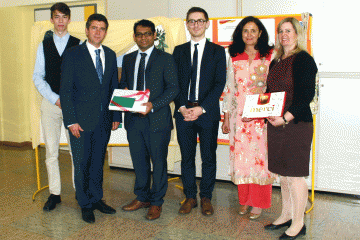International Week - Topic INDIA

Lukas Hauer, Direktor Mag. Peter Eisenschenk, Daniel Bonic and the two teachers Ursula Hebenstreit und Margaret Teichmann gave a warm welcome to Mr. Badhe.
Mr. Pawankumar T. Badhe, the 2 nd secretary responsible for politics and commerce, studied Computer Engineering at the University of Mumbai in India. After having worked as a software developer in the area of information technology for several years in the private sector, he joined the Indian diplomatic service in 2010. He was in charge of cyber security in India and later moved to Vienna where he has spent the last 5 years working in the area of politics and commerce as well as culture for the embassy of India. His latest mission was a UN Fellowship on disarmament which he completed last year. When his current mission is over, he will be returning to New Delhi, India, where he will continue working for the foreign ministry.
He gave us a very interesting talk about the economic situation in India and the bilateral relationship between India and Austria (see below).
India-Week on Monday in the 4bk
English
In small groups, we made a small presentation about a topic concerning India. Our group got the topic “India’s population”. We explained the Caste System and the different ethnic groups which exist in India. The presentations were great and interesting.
Guest lecture
Pawan Badhe, the second secretary of the Embassy of India, held a presentation for us about the economy of India and some important aspects that they have made or are changing. Before the presentation started, we watched a 10 min video, which showed and informed us about the general and geographical situation in India. For example we found out that, India is the second most populated country in the world and that their national animal is the tiger. The holy animal is the cow.
The presentation started with some information about the economy which is growing rapidly. India has a low unemployment rate of only 4.9 %. He presented facts and figures about Indian production in different sectors. Afterwards he explained Indian´s” young demography” to us. The average age in India is 32 years, which means that there are many young people to work in industry. Shortly after, he went on with the topic “Ease of doing business”, which he concluded with” Make-in-India (MII)”, a new program to promote Indian goods and services. Due of the fact, that he only wanted to tell us the most important information, he kept the rest of his presentation short. He gave us some information about the FDI, India ranking, railways, roads, ports, power for all, space, automotive, digital India, demonetization, IT, tourism and hospitality.
At the end, he answered some questions from the audience about a variety of aspects of Indian culture. It was very interesting and the audience enjoyed Mr. Badhe.
Science and India
In this lesson there were many stations with different information about India like animals, plants, physiology and Yoga, elements, spices and more. We got a spreadsheet where we had to fill in the title and some new things we had learned. After we filled out the sheet, the teacher asked us some questions in English and we had to answer them. If we did so, we got a stamp for the topic. In the end, we had to summarize one topic, in which we were most interested. All in all we learned a lot and it was creative.
